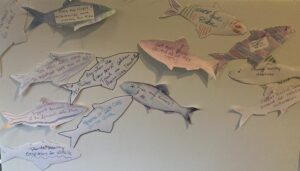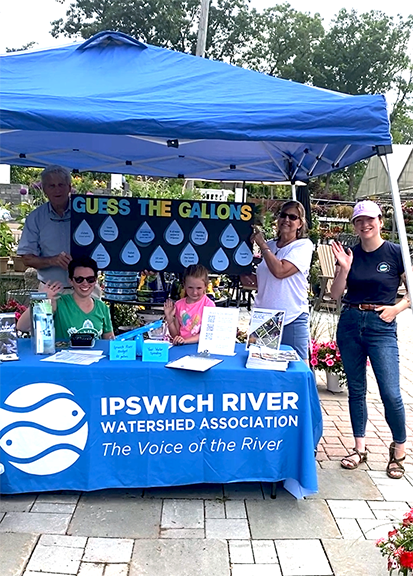PIE-Rivers Annual Meeting 2023

Thank YOU for a wonderful PIE-Rivers Annual Meeting!
On Thursday, December 7th, the PIE Partners, collaborators, and stakeholders met at the Parker River National Wildlife Refuge. Over 50 resiliency and restoration practitioners joined for a morning of information sharing, networking, and envisioning the work that the PIE-Rivers partnership can tackle over the next few years.
Our first panel presented on projects being worked on in the PIE region by a range of partners. The projects highlighted were selected to illustrate work done in each of the four priority action areas: Land Use, Water Conservation, Stream Continuity, and Water Quality.
- Neil Shea from IRWA presented on the variety of dam and culvert projects currently underway around the region to address barriers to fish passage and hydrologic flow.
- Robi Tobin from the Friends of Hood Pond spoke on the work this all-volunteer organization has done to address invasive species management in recent years. Robi’s presentation was an inspiring example of the important work being done by pond associations in our watersheds.
- Marissa Gast from Parker River National Wildlife Refuge presented on the marsh restoration project that is ongoing within the refuge to remediate ditches and pooling on the marsh, preparing it to better withstand the impacts of sea level rise in the future.
- Sara Cohen from MA DCR, presented an update on the work being done by the North Shore Water Resiliency Task Force. This task force is an unprecedented agreement between stakeholders within the Ipswich River watershed to collaborate to solve the water supply challenges collectively, balancing the needs for improved water supply resiliency and in-stream flow for ecosystem health. Not only is this collaboration a welcome shift for the Ipswich River basin, it also potentially provides a framework for other stressed basins, namely the Parker River watershed.
Overall, this group of presenters highlighted the range of projects that PIE Partners are working on to collectively address stewardship challenges throughout the region.
The second panel discussion outlined some of the many resources available to PIE Partners and collaborators in order to accelerate the pace of our restoration and resiliency work. Speakers from four different organizations highlighted the ways in which they are able to work with towns and other organizations to provide funding, technical assistance, or connections with others working in this field:
- Kathryn Glen, North Shore Regional Coordinator at MA Office of Coastal Zone Management
- Hanna Mogensen, Coastal Resource Planner & MassBays Regional Coordinator, Merrimack Valley Planning Commission (MVPC)
- Leah Robins ,Director of Government Affairs at Metropolitan Area Planning Council (MAPC)
- Alicia Geilen, Wetlands Circuit Rider, MassDEP Northeast Regional Office.
It is these types of collaborations that the PIE Partnership is intended to facilitate and it was wonderful to have such a knowledgeable panel discussing the ways in which we can leverage their various areas of expertise and available resources.
Finally, to close out the meeting, attendees sat in small groups to discuss where the PIE Partnership should focus its efforts in the coming years. A few key takeaways from these discussions include:
- A need for more education and outreach. A common theme among the groups was the need for increased public awareness and education about the work we are doing. For example, towns are trying to educate residents about stormwater issues and the role that each person plays in collective stormwater management. There remains a lack of understanding as to how the ecological restoration work PIE-Partners do is related to the adaptation work needed in the face of climate change. Story Maps and signage were cited as specific ways to increase the visibility of our work. There may be a need for training for restoration and resiliency practitioners on how to communicate effectively with an audience, manage citizen science projects, and foster citizen advocacy.
- A need for geographic balance. Many of the large-scale federal funding grants that the PIE-Rivers Partnership have won in the past have been focused on coastal areas, especially within the Great Marsh ACEC. Attendees emphasized that the partnership should also focus on the upstream and freshwater parts of our watersheds.
- A need for more resources. A common theme for this year’s annual meeting was leveraging the resources available to the partnership to continue to implement previously identified priority actions.
Thank you to everyone who attended this year’s annual meeting and participated in these productive discussions. The informal conversations that attendees had during breaks and lunch following the meeting proved to be invaluable opportunities for information sharing as well.
There was a clear desire to have more opportunities to engage and converse with partners collaboratively and informally, so stay tuned for more PIE Partners events in 2024! Hope to see you at our next in-person networking event for Pi(e) Day – March 14th 2024!
Presentation Slides fromt he 2023 PIE-Rivers Annual Meeting are available here.
Please feel free to email ebcasey@pie-rivers.org with any feedback on this event, thoughts on PIE-Rivers priorities moving forward, or to connect with resources in our region.



This Post Has 0 Comments